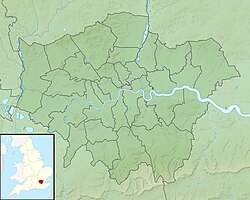| Brixton Mosque | |
|---|---|
 | |
| Religion | |
| Affiliation | Sunni Islam |
| Sect | Salafi |
| Ecclesiastical or organizational status | Mosque |
| Status | Active |
| Location | |
| Location | 1 Gresham Road, Brixton, South London, England |
| Country | United Kingdom |
Location of the mosque in Greater London | |
| Geographic coordinates | 51°27′55″N0°06′46″W / 51.4652°N 0.1127°W |
| Architecture | |
| Type | House |
| Completed | 1990 |
| Website | |
| brixtonmasjid | |
The Brixton Mosque, officially known as The Brixton Mosque and Islamic Cultural Centre, and also known as Masjid ibn Taymeeyah, is a Salafi Sunni mosque, located in Gresham Road in the Brixton area of South London, England, in the United Kingdom. The mosque is managed by Black British converts and is known for its history of controversy. [1]
